Interview: Natalie Ibu Talks GOOD DOG
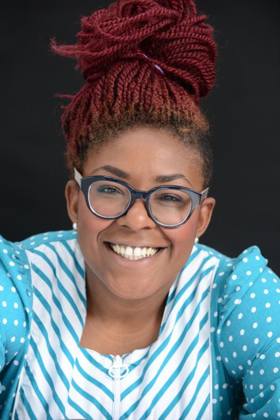
Natalie Ibu, artistic director of Tiata Fahodzi, is taking Arinzé Kene's good dog back on the road after a stellar success in 2017. Here, she discusses her journey into theatre, directing the tour, and the importance of self-care in the industry.
Why did you want to become a director?
I think I started by wanting to be an actor, as quite a few of us have, and then I had that moment of realisation that I wasn't the best. I remember growing up writing a lot and doing a young writers program at the Traverse when I was about 16 and writing angsty plays.
At some point, and I don't remember the moment, but at some point I realised I wanted to be a director. And I wanted to be an artistic director, specifically, which feels really odd at 17... how did I know that it was a job?! How did I know I wanted to do it?
I think often about my relationship with the Traverse - I feel like I grew up in that building through those workshops. I must have encountered the artistic director at the time, and there must have been something about him - I suddenly wanted that job. I realise now that I am an artistic director what that was all about. There's something about bringing people together and connecting them that I was attracted to.
Being a director to me was about telling stories, about collaboration, about wanting a way to find a language for the things that we were feeling. I wanted to be part of grappling with the language, words, and ideas to help me, in the first instance, and us collectively too to understand what it meant to be here. That's from an artistic point of view, and then from a leadership point of view, I wanted to bring people together.
Did you go to the theatre a lot as a child?
My memory is of doing rather than viewing. Although my mum would argue that she took me to the theatre, but I don't have lots of memories of shows that I saw. My memories are of being in a youth theatre show - that's what sticks to my brain.
And a memory of being at the Traverse doing these workshops in the evening, with John Tiffany and actors, and feeling very lucky and a bit exposed. My primary kind of memory is participating, yeah. But I also think I've always told stories... me and my friends, about our teachers... always reading and writing and thinking up stories.
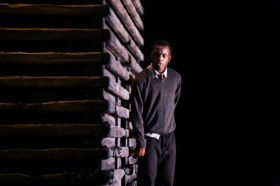
Where do you draw your inspiration from?
This will sound so wanky, but life! One of the things I love about rehearsals is this opportunity to pull together a range of references, a range of experiences held within the people you're working with, but also the people they know and have encountered.
And to find a way to navigate the imagination of the writer. At every process, since I started directing, I've been hit by that moment when life starts to imitate art.
You start to see the art, you see the theatre, you see the concept everywhere. And you can't believe you've never seen it before. You have to live it, only in this moment it feels like life is connecting, even though it's been there all the time. Life is a big thing.
Pictures, finding other ways to counter the text - I'm a very text-based director, so I'm always trying to find ways to approach it. Music, images, films, documentaries. Other means where artists have tried to grapple with what I'm grappling with.
Do you still like going to the theatre? How do you approach that side of it?
[laughs] You know, sometimes. It's a mixed bag, isn't it? I wouldn't be doing what I'm doing if I felt that the work I want to do was already out there. I love going and seeing what other people making. I love being in audiences and learning how they respond to the work. I think it is interesting when something is a job.
There are very few occasions when I feel like I am an average punter. The moments when this happens are mainly event theatre, so whenever I go to Regent's Park I feel like a punter and I get excited. When I go to the West End, seeing Hamilton, when I bought the ticket a year in advance I felt like a pure audience member. I'm always looking for those moments when I can forget that this is my industry.
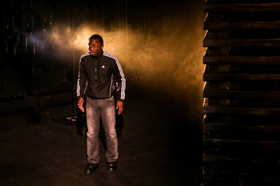
What's your proudest achievement so far?
I think there are two things. One is I am a black, working-class, queer woman from Scotland - the fact that at 17 I knew I wanted to be an artistic director and at 31 I became one, I'm really proud of that.
I'm really proud that I trusted my instinct when theatre felt like it was saying "This is not a place for people like you". I've had to take breaks, I've questioned my right to be in the job that I'm in, doing what I do, but I really listened to that 17-year-old girl who knew that she wanted to be an artistic director but didn't know why and how to be one.
She navigated the industry and tried to find out how to make that possible. The world of theatre didn't look like me, and it's sort of odd to have so boldly said "This is what I want to do". So, that.
And then not to segway into it, but there's something about bringing good dog back. It's a two-and-a-half hour long experience, one act, a monologue. A young black boy. There are lots of ways that felt challenging when we were first producing it years ago on the mid-scale.
It's not a studio show, 60 minutes straight through. Me and my team and the creators all knew we were making something special - we were holding our nerve and not trying to make it smaller or easy just to fit it into a studio.
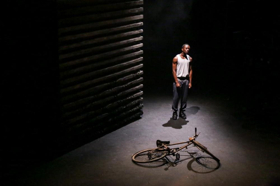
To have done that for four weeks with a response that meant there was an appetite for a story like that, to double it and to bring it back for eight weeks now, it's brilliant. Had we conformed to what might have been expected of us, a young company of colour telling stories about people of colour, a monologue for a young actor...
If we'd gone "This should be small" I don't know if we'd be here. I'm proud to have let the art lead us. I'm proud to have listened to Arinzé's desire to tell the story in an epic way. This is not a small piece. It's epic. It argues who should be telling black stories. We have someone who traditionally isn't at the centre of our stories. I'm proud of that.
What is good dog about?
It's a monologue about, I would say, the people and places that make you who you are. We meet a 13-year-old boy and he takes us on a journey through ten years, telling us his own story, but also the story of the people around him.
His neighbour who's trying to teach his son to play cricket so that he can get scouted; his other neighbour whose husband is having an affair with the woman across the street; his local newsagent who's battling with rats and a stray cat that keeps slipping through his stall door.
He tells us about the way they're all trying to be good in the hope that good things will come to good people. The lessons he learns about life and the world. I guess adulthood, when you realise that perhaps you've been lied to. The principles and the philosophy of how to live a good life actually don't work and how to navigate the world.
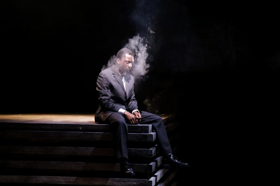
Who would you like to see the play?
Everyone. We're making a play for Britain. That's the way we approach our work. Our characters are of African heritage, but they are Everymen.
I'd love young boys to come and see it. I'd love teachers to come and see it. I'd love parents to come and see it. As we learn through his eyes, we learn how it is to try to make sense of the world.
Perhaps it's a call to action to all our peers and all the people in positions of power to arm our teenagers better, arm our children better. You know, I'd love the government and politicians to see it - it's about the people who are underestimated and oppressed and what happens when you keep pushing them. It's about protest and resilience.
Is directing a tour different from directing a show in a certain theatre?
I'm still learning! I'm still learning four years into the job how to make a show to tour. I think the thing is that you want it to be the best show in every place it goes.
That's about making something bespoke, but something that can stretch and shrink depending on the venue. It's about the people you bring around you - you need to make sure they're flexible and adaptable and entrepreneurial, problem-solvers, committed to the product.
It's about the actor - I feel like acting and rehearsing then lead to a marathon. You want them to be so secure in the work they're doing that they're not worried about a new venue, that they can flex and adapt to different venues and audiences. I think it's about keeping in touch with the work too - and that's not to say that you don't do that when you're making a show for one place, but even more so in a tour.
I have an associate who will get the show in every venue to ensure the quality and standard is exactly the same as if it was the first night back in Watford. For me, it's more about the maintenance than it is about how you make something. The creative team was designed to tour, so they know what it means to put the show up in a day and get it down in a day. But in terms of the work that I do, it's more about sustainability and confidence in the work.
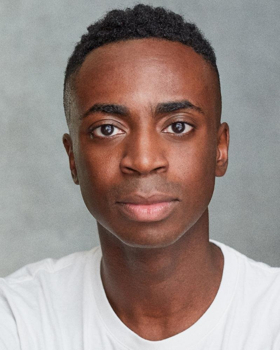
Why do you think it's crucial to tell this story again now?
Arinzé wrote this in 2014 - he'd been motivated to write it, as he was thinking about why some of his acquaintances had been involved in the riots of 2011.
I encountered the play in 2014 and I went back to it again in 2016, I felt that there was something similar about the energy of that time, kind of cusp-Brexit. It felt scary and it felt that something was brewing.
This play perhaps had a warning to give us all and I feel we're still here. I don't feel any more assured, any less restless, any less concerned for the future of us than I did then.
I feel like there's still a need to have a conversation around the play. The ramifications are still valid. In many ways our programming the play having been here before is all about "Let's not repeat our mistakes, let's listen".
Are you changing anything from the previous production?
Yeah, the actor! We've got a new actor, Kwaku Mills, who's amazing and we're having a hoot in rehearsal. He will naturally bring a new perspective.
He's already challenging things that I didn't see the first time. I'm like "Oh, yeah! Gosh! So let's make sense of that". He's a different actor, so he'll bring different qualities to the character. It's an opportunity to have another go at something. That's really exciting, that's not something we had the opportunity to do before.
Is there anything you wish you'd known about the show before you put it on the first time?
Making the first show was really scary. It's big, but we held our nerve - I stuck to my guns about this being an important show that needed to be on the mid-scale. I'd never done it before. So, that!
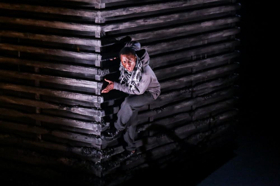
What were your thoughts going into it?
That I had to make the best show I could make. This play is phenomenal, Arinzé is an amazing writer.
Amelia Jane-Hankin, who designed it, has created this amazing 3x3x3 wood block that chars and ebbs and smokes and lights up. I just had to do justice for everyone. I think it was about "How do I do it?".
Now I know how to do it, I know how to get there. There were times the first time around when I wasn't sure we were going to get there. I wish I'd known every step of the way that we'd get there. But that's the luxury of the remaking, "Oh, it works!".
What would you like the audience to feel when they come out of it?
We want to go on a journey. We want to grow up with the boy, feel like we've met this collection of characters, and that it's multiple and that they're painted in rich colour. I want us to feel that they're familiar.
There's this lesson in the resilience of the human being: we bounce back and we make good of really challenging circumstances. We find a way to make it work.
I want us to be activists in our lives, I want us to speak up to those in power about what is right and what is wrong. The play makes an argument that this community have had enough of what's been dealt to them and in the end protest the things that have been oppressing them. I think it's a provocation about when you stand up and what you're going to stand up for.
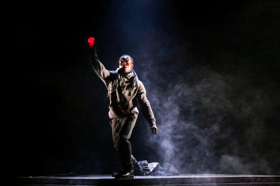
What would you say to someone who's just coming into the industry right now?
First, that it's OK to make the decision - it's OK not to be sure about it and it's also OK to change your mind.
I think we feel that we have to see it through. I constantly have to verify it, 15 years into my career, 18 years into knowing that this is what I want to do. I'm constantly reflecting on it and remaking the decision. Once you've made it, there are other decisions to make.
I'd say to look after yourself. There's this king of fallacy - even though I think it's dying now - around true artistry and the requirement to suffer: that true artistry is about working more than everyone else, sleeping less than everyone else... I have been the worst for that. Look after yourself - start with you. Nourish yourself. Sometimes, this sector isn't going to do it.
These are really lessons I wish that I'd been told at 17. Absolutely know your sector, immerse yourself in it, but it's also really important for that inspiration question I've answered earlier to remember we're part of a world, a community, and a society that isn't just theatre. You need perspective and to see all of life as your research, and your professional development.
good dog starts touring at the end of January 2019
Photos are of the original production in Watford featuring Anton Cross (credit Wasi Daniju)
Videos
